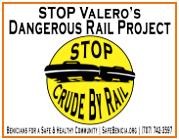Repost from the East Bay Express
[Editor: I am posting this excellent review by Jean Tepperman belatedly, with thanks for East Bay Express’ regional coverage of a Benicia story with huge regional and national implications. I’ve not read a better review of the Feb. 8-11 Benicia Planning Commission hearings. – RS]
Benicia Blocks Oil-By-Rail Plan
By Jean Tepperman, February 12, 2016
The little town of Benicia is looking to become the next link in the chain barring crude oil from traveling by rail to the West Coast. After four evenings of contentious hearings, the Benicia Planning Commission on Thursday unanimously rejected Valero refinery’s proposal to build a rail spur that would allow it to import up to 70,000 barrels a day of “North American crude oil” — meaning extra-polluting crude from Canada’s tar sands and the highly explosive crude from North Dakota’s Bakken shale fields. Both fossil fuels have been involved in numerous derailments, explosions, and fires, including a 2013 fire and explosion in Lac Megantic, Quebec that killed 47 people.
Starting on Monday, planning commissioners, led by Commissioner Steve Young, grilled staff members about their decision to recommend approval of the Valero project, identifying inconsistencies and pointing to problems that the project would create, from blocking traffic to increasing pollution to potential oil spills and other emergencies that the city would not be able to cope with. The central issue that emerged, however, was whether the city had the authority to make decisions about the project.
The staff report actually said the benefits of the project did not outweigh the potential harm. Shipping crude oil by rail, the staff found, would have “significant and unavoidable” impacts on air quality, biological resources, and greenhouse gas emissions. These impacts would conflict with air quality planning goals and state goals for reducing greenhouse gas emissions. But the city can’t prevent any of this, the staff report said, because only the federal government has the authority to regulate railroads.
Bradley Hogin, a lawyer whom the city hired on contract to advise on this project, said federal law prevents local governments from interfering with railroads, a principle referred to as “preemption.” According to the interpretation of “preemption” described by Hogin and city staff, local governments are not permitted to take actions that “have the effect of governing or managing rail transport,” even indirectly. And they are not allowed to make decisions about a project based on impacts of rail shipping connected with that project.
“Hogin is making a case that would affect cities across the nation dealing with crude by rail,” said environmental activist Marilyn Bardet in an interview. “They were going to create a legal precedent on preemption here.”
Bardet reported that public testimony by representatives of environmental organizations and “two young women from the Stanford-Mills Law Project made it clear that “there are many people who would disagree with Hogin’s interpretation.”
Roger Lin, lawyer with Communities for a Better Environment, said in an email that, contrary to Hogin’s claims, the California Environmental Quality Act actually requires local governments to consider “indirect or secondary effects that are reasonably foreseeable and caused by a project, but occur at a different time or place.” Valero is not a railroad, he said, so the “preemption” doctrine does not bar the city from using its land-use power to reject the project.
However “preemption” is interpreted, Bardet said, “the commissioners seemed uncomfortable with being told they would have to approve the project based on considerations they couldn’t accept.” Late in the hearing process, commission chair Donald Dean said, “I understand the preemption issue on a theoretical legal level, but I can’t understand this on a human level.”
Bardet expressed appreciation for the commissioners’ concern. “My sense was that these guys are real human beings,” she said. “They all listened carefully. None of them was asleep.”
Project opponents packed the hearing room for four straight nights, filling two overflow rooms on the first night. People came from “uprail” communities, including Davis and Sacramento, as well as allies from across the Bay Area, Bardet said.
Opposition to the project has been led by a community group, Benicians for a Safe and Healthy Community, formed in 2013 when the city seemed ready to approve the project without requiring any environmental impact study. “We joined with other refinery communities in the Bay Area Refinery Corridor Coalition” and in a coalition working to persuade the Bay Area Air Quality Management District to pass tough new regulations on refinery pollution, Bardet said. She said support from the National Resources Defense Council and Communities for a Better Environment was also important. “The grassroots came alive together,” she said.
Many of these organizations, like the Benicia group, are concerned, not only about the hazards of shipping crude by rail, but by the impact of refining the extra-polluting crude oil from Canada’s tar sands, Bardet said. She noted that the city’s environmental review of the project made no mention of this issue, although it is well established that refining dirty crude oil, like oil from tar sands, emits more health-harming pollution as well as more greenhouse gases.
Valero is expected to appeal the planning commission decision to the city council, which could meet to decide on the issue as early as mid-March. “The city council is going to be hard-pressed to reject the views of their own planning commission,” Bardet said.
She emphasized the significance of this decision for the national and international issue of shipping crude oil by rail. “The whole world is watching,” she said. “I just got a message from a guy in New Jersey congratulating us.”



You must be logged in to post a comment.